Congress approved a bipartisan spending deal that would avoid a government shutdown before the election.
House Speaker Mike Johnson, a Republican, announced the new temporary funding proposal Sunday that will last nearly three months and features some deviations from the original bill he introduced earlier this month.
Several go against Donald Trump’s wishes and some make concessions to the Democrats.
Earlier this month, Trump said that if Republicans “don’t get absolute assurances on election security,” they should not hesitate to shut down the government.
No such safeguards were seen in the new bill, which will fund the government through Dec. 20. It did not include any part of the SAVE Act, the Trump-backed proposal requiring Americans to show proof of citizenship to register to vote.
House Speaker Mike Johnson, a Republican, announced the new temporary funding proposal Sunday, which will last for three months and included some deviations from the original bill he introduced earlier this month.
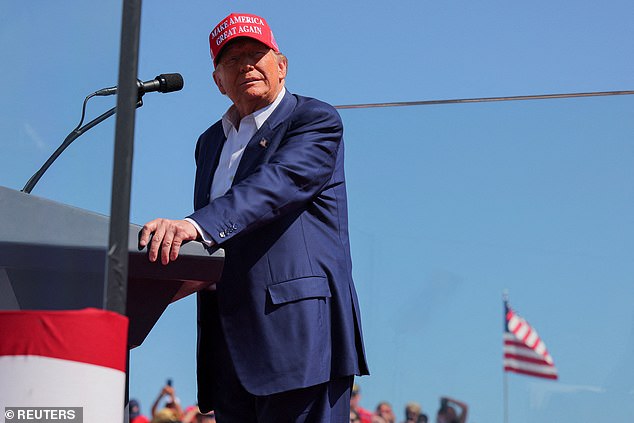
Several go against Donald Trump’s wishes and some make concessions to the Democrats
“While this is not the solution any of us prefer, it is the most prudent path forward under the current circumstances,” Johnson wrote in a letter to his Republican colleagues explaining the rationale for the temporary bill.
‘As history has shown and current polls confirm, shutting down the government less than 40 days before a fateful election would be an act of political malpractice.’
He added that the budget measure would be “very narrow, basic” and would include “only the extensions that are absolutely necessary,” and that “since we fell a little short of the goal, an alternative plan is now required.”
“Everyone’s comments and ideas have been very helpful, and next week the House will take the lead and pass a clean three-month (continuing) resolution to prevent the Senate from bogging us down with a bill loaded with billions of dollars in new spending and unrelated provisions,” the Republican continued.
‘From now until Election Day, I will continue my tireless efforts and singular focus on increasing our majority for the 199th Congress.’
“It is a great honor for me to serve with all of you in these historic days,” concluded the speaker who was seen chatting with Trump at Mar-a-Lago last weekend.
“The future of our unique nation depends directly on our success, and I am confident that together we will prevail.”
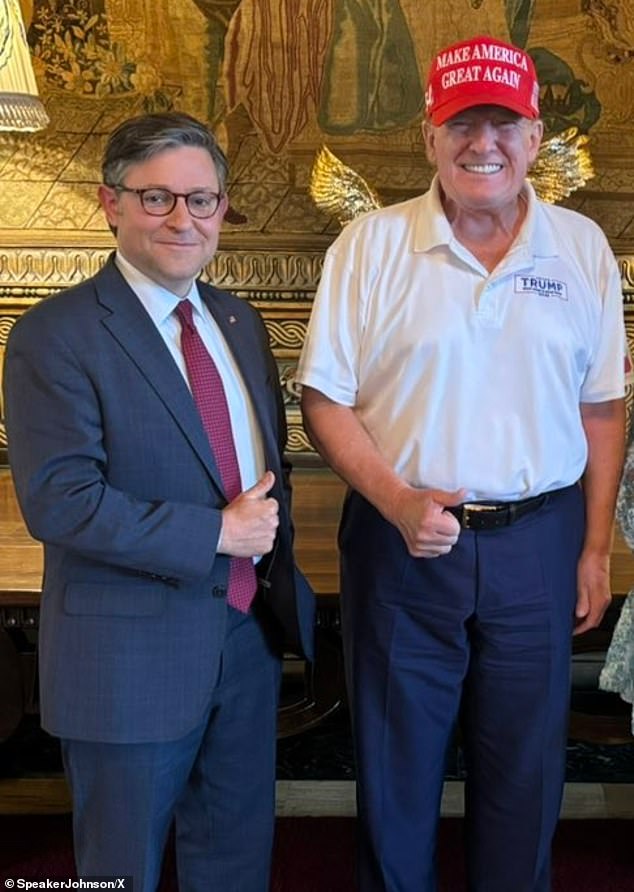
Earlier this month, Trump said that if Republicans “don’t get absolute assurances on (amendments involving) election security,” they should not hesitate to shut down the government. The couple was spotted together last Sunday at Trump’s Mar-a-Lago mansion.
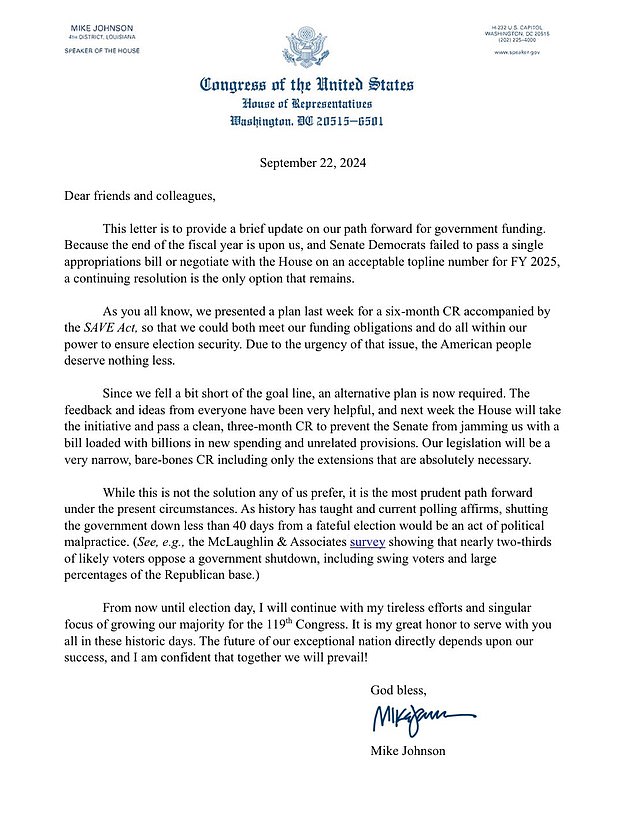
No such guarantees were found in the new bill, which will fund the government until December 20.
The last-minute compromise appeared to avert a funding fight that would have stretched into the spring of 2025, and the Trump-backed proof-of-citizenship voting bill was one of the recorded casualties of the process.
Also absent was funding for the Virginia-class submarine program included in earlier drafts, which sought to allocate about $2 billion to the Defense Department for “shipbuilding and conversion” of the program.
Aides insisted Sunday that the funding came after a “joint conversation” between funders, defense officials and the Biden administration.
The bill also failed to address what the Department of Veterans Affairs (VA) has framed as a potential $12 billion deficit facing the agency for the next fiscal year, a stipulation demanded by Democrats.
Republicans have argued that more information from the agency on the budget gap is needed before Congress acts, while lawmakers from both parties said Sunday that there is still more time to address the threat in the coming months.
The decision comes after Congress passed legislation last week to address a more immediate $3 billion shortfall for the VA, in response to a warning that veterans’ benefit payments were at risk of being disrupted as early as next month.
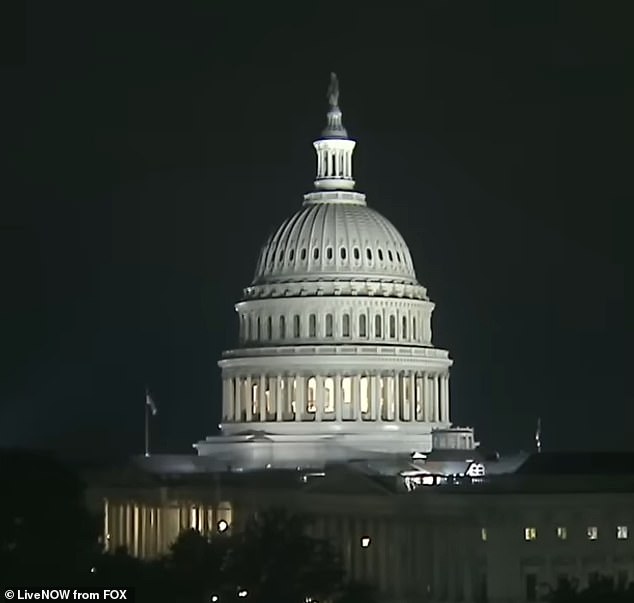
The last-minute deal appeared to avert a funding fight that would have stretched into the spring of 2025, with the Trump-backed proof-of-citizenship voting bill one of the recorded casualties of the process.
The three-month stopgap relief also excludes $10 billion in additional funding for the Federal Emergency Management Agency’s disaster relief fund requested by Republicans.
The provision was previously included in House Republicans’ initial six-month draft, which was shortened to two and a half months to appease Democrats and some less defense-focused Republicans.
The new version of the bill allows for the use of some resources from the fund for disaster response.
“We’ve made a joint decision to address, because it’s going to be a two-and-a-half-month CR, the disaster side with no additional disaster money,” House Republican aides told The Hill on Sunday.
They noted that there is still money for disasters in the form of a “disaster relief fund within FEMA that will be replenished as soon as the CR becomes law,” which they said would be “more than adequate for the two-and-a-half-month period.”
“Further discussions” on the matter will be held in the coming months, the sources said.
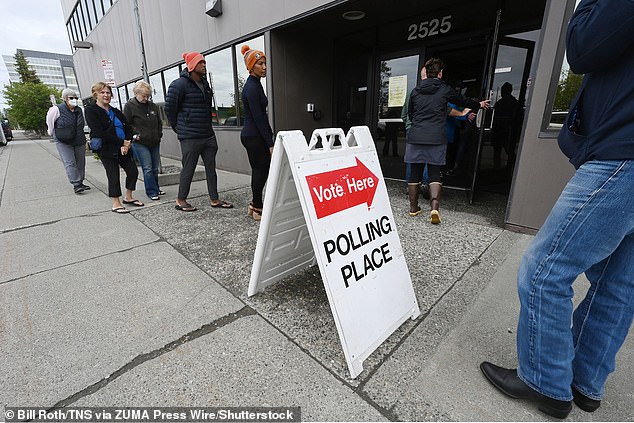
Perhaps the most notable omission was Trump’s SAVE Act, a bill that would restrict non-citizens from voting in elections by requiring proof of citizenship. The new bill is expected to reach the House floor by midweek, after which it will move to the Senate for consideration.
But perhaps the most notable omission was Trump’s SAVE Act, a bill that would restrict non-citizens from voting in upcoming elections by requiring proof of citizenship.
But nearly all Democrats voted against it, and a handful of Republicans did as well, with many calling it not conservative.
Last week, Trump took to Truth Social to encourage Republicans to move forward with the SAVE Act even if it meant a government shutdown, writing: “If Republicans do not understand the SAVE Act, and every ounce of it, they should not agree to a Continuing Resolution in any way, shape or form.”
“Democrats are registering illegal voters by the TENS OF THOUSANDS, as we speak,” he continued, echoing his previous claims that the 2020 election “was stolen.”
“They will vote in the 2024 presidential election and they should not be allowed to do so.”
Additional money was also included to bolster the Secret Service, which has faced criticism following two failed assassination attempts on the former president.
The new bill is expected to reach the House of Representatives by midweek, after which it will move to the Senate for consideration.

